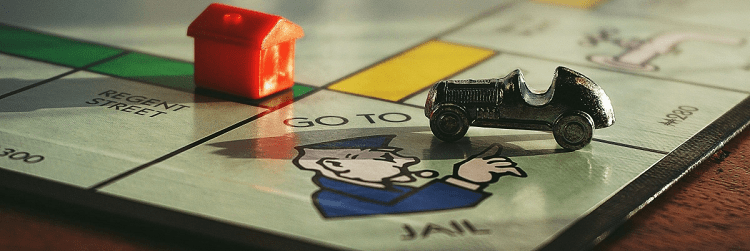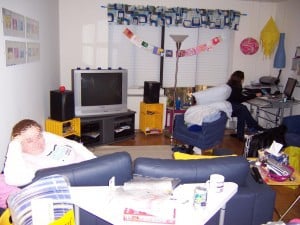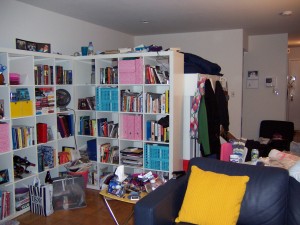This post may contain affiliate links and Corporette® may earn commissions for purchases made through links in this post. As an Amazon Associate, I earn from qualifying purchases.

Update: We still stand by these personal finance thoughts on how where you live is one of the biggest money choices you make, but you may want to check out our latest discussions on home ownership, including what to do first when you buy a home.
One of the biggest money choices you make is where you live. When you’re renting, the kind of rent you pay can hugely affect your savings and your cash flow. If you’ve bought, your mortgage payment may now be the biggest factor in what kind of job you can take.
How to Decide How Much to Spend on Rent or Mortgage
Experts generally say that your rent should be no more than 25-30% of your salary. When I first started working right out of college, that was laughable — even with a roommate, I couldn’t find a place that I felt safe living in for less than $X, which wound up being 50% of my salary. Yeouch. On the flip side, when I got out of law school, that math (25-30%) meant I could have spent as much as 3X on an apartment — which a lot of my friends did. For some people, I think they thought they “deserved” to come home to a swanky apartment; for others I think they thought, “I will never see this kind of paycheck again! I’m going to enjoy it!” But cut to three or four years later, and they suddenly didn’t want to leave that nice apartment or that lifestyle, and it had an affect on which jobs they looked for. Hello, golden handcuffs.
My advice to people who are just starting demanding jobs: realistically gauge how much time you’re actually going to spend in your apartment. My thought when I got out of law school was that I would not see my apartment, because I expected to be working long hours (and I did). Furthermore, those crazy hours don’t really “break” for the first 2-3 years, which meant I stayed in my first apartment out of law school for about that amount of time simply because I had no time to search for another apartment. So the rent you willingly pay, right out of law school, will have a huge impact on your savings, your cash flow, and it can even influence what kind of job you can take. Let’s take a look at the number differences between two hypothetical renters, each making $100K:
– Person A pays 25% of her salary for rent, or $2083. Over 3 years she spends $75,000 on rent.
– Person B pays 30% of her salary for rent, or $2500. Over 3 years, she spends $90,000 on rent.
Note that with the difference in money, Person A could have saved an extra $15,000, using it for an emergency fund, investments, or to pay down debt. (With interest or good investment returns, that could be even more.) But really — depending on your city and your salary, even 25% can be a huge splurge. How low can you go? For example, someone paying 18% of her salary still has $1500 to spend on rent, but has $36,000 more than Person B at the end of three years.
How to Decide Where to Live
So how do you decide where to live? Some factors to consider:
– Where are you coming from? In law school I lived with 3-4 roommates in the top few floors of a townhouse on Capitol Hill that was in such a state of disrepair that we seriously worried that the “picture window” would fall off the building. We had a mixture of “we found it when we moved in” furniture (a broken, funky arm chair stands out in my memory), “it was super cheap at the store” (a $.98 plastic tablecloth that we used in the kitchen), and “I’ve had it since college” (or even “my parents have had it since college”) furniture. So to me, it was a HUGE splurge to live by myself and get a studio apartment with a loft bed in a nice area of town (Fifth Avenue, between 15th and 16th Street.) (I believe it was 13% of my salary.)
– Safety. I had always lived in doormen buildings before in NYC, but I knew that a) I could get packages delivered to my office, and b) the company I worked for paid for you take a car or cab home if you worked past 8 pm. Keep in mind that many cab drivers will be kind enough to wait until you get inside the building if you ask them. If you’re in similar shoes, take a look at the surroundings of your apartment — are there businesses that are open and bring foot traffic? Restaurants are great, but even a bodega will do. Bars or “all night ATMs” might make me think twice, but it’s still better than an isolated spot. I once spent a summer internship living on a block that had a parking garage and some residential, non-doormen buildings on the street — I worried every time I stepped foot outside the apartment, no matter what time of day it was. Similarly, take a look at your building’s security — while my studio didn’t have a doorman, it did have a video intercom and several doors that required keys.
– Amenities. A gym in your building is amazing, but weigh how much you’re really going to use it. Laundry drop off/pick-up is one of the big things that I know a lot of friends made use of in doormen buildings.
– Other factors that will affect your budget and time. For example: is the apartment located so far from public transportation that you’re going to want to take cabs everywhere? If you have a car, are you going to end up a) paying through the nose for a private spot, or b) spend half your weekends hunting for a spot on the street, moving it for street cleaners, or worse?
(A note on buying: I had some single friends who bought apartments when they came out of grad school, either on their own or with the help of their family. It was the early 2000s, and so it turned out very, very well for a lot of them — after three or four years living in the space they sold it for crazy profits. (One friend made a 65% profit on her apartment, I kid you not.) Other friends found themselves stuck with a huge mortgage that restricted their lives as well as what future jobs they looked for. Had any of my friends who owned been laid off or fired, I suspect they would have been absolutely panic-stricken.)
Finally, for my $.02, I would advise decorating your apartment with the theory in mind that if you see it, it will be at night. I’m a fan of dark wood furniture, jewel tones, and black accents — but when I got my first apartment after law school I decided to go with white furniture and a “mod” color scheme (inspired by one of my grandmother’s scarves) of navy, hot pink, and yellow. It made me happy when I came home at night, and it looked cohesive. (Pictures after the jump if you care to see.)
Readers, what percent of your salary do you pay for rent or mortgage? What things do you love about your apartment, and what regrets do you have?


(Above: my studio apartment with a loft bed (behind the bookshelf), where I lived from 2003-2006. Pictures taken by my friend T when she came to visit in 2005 — it was a huge mess then, obviously!)
2020 updated photos (red Monopoly house) via Stencil.




Canadian
This is such an interesting conversation!
My current place is less than 10% of the salary I will have when I start articling this year in Calgary, AB. My boyfriend and I live in a small house (circa 1912) in a fun, trendy area of the city that is well connected to the downtown core via public transit and pedestrian foot paths (it will take me approx. 10-15 min to get to my desk from my home in the morning). We have a lot of natural light (as much as you can get all the way up in Canada, I suppose), and our place has a great view of the city skyline. We split the rent equally (which is why my percentage is so low), and we also equally share all of our utilities and other bills (cable, internet). We’re responsible for all of the yard work which is incredibly annoying (shovelling copious amounts of snow, mowing the lawn with the landlord’s antiquated manual motor), but we have two parking stalls, dishwasher, washer and dryer included in our rent and it is nice to have some outdoor space (I think we got such a good deal because our landlord overreacted to how badly the housing situation was and consequently set a ridiculously low rent).
Our landlord approached us re: buying the house a few months ago, but we declined because we just aren’t in a financial position yet to even qualify for a mortgage (because I won’t start my article until June and my BF still has one more year of law school to go). When we eventually buy property I think it will likely be in a similarly appointed area in a house, as my BF is convinced that it is better to own “land” than to own a condo.
desperate in DC
Thank goodness people started piping up about living in DC on a public interest/government salary! I’m in that situation and looking at all the numbers of all the BigLaw folks in NYC makes me panic (though obviously I know the low percentage is >= a much higher $ amount than it would for me given my salary). I’d be super glad to hear from more public interest/govt folks, especially in the DC areas…I’m starting to wonder if I have to live with 7 people; and/or hundreds of roaches; and/or a multi-hour commute in order just to keep it below the % guidelines or if us public interest/govt folks in pricey cities really just have to turn kind of a blind eye to those guidelines??
Anonymous
I live near Dupont Circle for 24% of my gross/38% of my take-home (post-tax, 401k, Metro, etc) and I work for a nonprofit making less than 70K. No roommates and a walking commute; only the very occasional roach. Most of my coworkers live in the District, even ones with families (you can get a 2 bedroom in Brookland or Glover Park for $1500 or so) although they tend to move to the suburbs if the kids are old enough to go to school. So don’t worry, you can do it.
gov't worker elsewhere
I think I spend 38% of my take home pay on rent. I live in the state capital and most of the non-student apartment complexes here seem to set their rent based on what they assume the average state worker can pay and still meet the minimum income restrictions (33% of gross). I know in my neighborhood the apartments are in reach for most state workers but it’s impossible for all but the highest paid to be able to buy a home here. This area is not objectively expensive, but it is pricey once you realize what the average person is paid compared to how much everything costs.
EG
My comment above is on government salary in DC. As in, first house I was living in (Glover Park, actually) I was making less than $30k. Second place, bumped up to $33.
kz
When I was in DC working for the government (it was a political, not law or agency job), my rent was about 21% of my gross salary, and I was living in Arlington and had to take a bus to the metro, so it would have been a lot higher had I actually lived in DC or within walking distance of a metro stop. But I also had metro benefits, so I wasn’t paying to commute to/from work, and some student loan repayment assistance–if you’re working for the government, definitely ask about transit benefits/loan repayment assistance to see if it’s offered.
M
Look in a neighborhood like Glover Park (near Georgetown) and get a roommate! You can get a nice place for about $1400 – 1500 total, and then you could split the cost with a roomie. It’s a safe neighborhood with good bus transportation, and lots of shops (including a Whole Foods and a Safeway). In DC, I started on very low salary out of law school in ’05 and I paid about $700 a month with a roomie for at least 3 yrs. Now I have a new job, make more money and can afford to live by myself. (The best way to look for a place in GP is to go the neighborhood and walk around, most of the apartments are 4-unit buildings with independent owners.)
I think it’s a huge sacrifice to move far away when you are living on a small salary, because you can save so much by living in the city because it gives you access to so much more at minimal cost and frees you of the need to have a car. (If you feel like you do need a car, then get a Zipcar membership, there are spots all over the city.)
M
(The best way to look for a place in GP is to go the neighborhood and walk around, most of the apartments are 4-unit buildings with independent owners.)
Walk around and look for signs in the front of the buildings is what I meant to say…
Anon
Two words- leaving New York. We got a beautiful amazing place in Seattle for what we sold our tiny shoebox for in New York. Paying still more than seems reasonable, but it’s less than 15% pre-tax income each. And I love, love finally coming home to a place I enjoy, after spending years 18-33 in studios and dumps. It’s worth it even though I cringe at the bills a bit. I am making much more than used to so it’s doable. And maxing out savings plans, paying down debts, and enjoying life. Leaving a more pricey city for a less pricey but still expensive city made a huge difference. Also my new city has no income tax, so got a 18% ‘raise’ by leaving in take home pay.
Of course where you are within a city matters a lot. We’ve always chosen neighborhood over space, but I respect others’ decisions.
Totally random, but gripe on Seattle… generally I love and adore it and have made it home probably for good. But the slow, ridiculous drivers… they go under the speed limit in the left lane, won’t move, don’t follow traffic patterns, let others in stopping in the middle of the road which is unsafe.. they drive me nuts. Driving is the only thing I prefer NYC to here on (well not driving although I don’t miss the subway exactly). Sorry for rant, was a long ride home today! They could fix their budget problems here just by enforcing traffic rules on the turtles:)
meara
Hah! I moved from DC to Seattle, and told my NY-native best friend that she is not allowed to drive here, because the drivers will make her crazy. I kind of love it though–people let you merge!
PittsburghAnon
4.8% in Pittsburgh in a very nice, small 1 bedroom with a killer view.
MissJackson
I’m in Pittsburgh, too, and you’ve officially made me feel un-frugal :-)
PittsburghAnon
I live in a relatively obscure, but nice neighborhood, and make pretty good money for this area. :)
EK
I pay $440, or 15% of my take-home pay, to rent my perfectly decent, 600 sq ft one-bedroom apartment. My neighbors complain about how much housing costs around here, but I remember what I used to pay to live (with roommates) in NYC and laugh all the way to the bank.
I sometimes get jealous of friends with more space or amenities, but at the end of the day, I’m not interested in giving up any of the other things I spend my money on– including paying down student loans, saving for retirement and a rainy day, and giving to charity. I like the way I spend my money. I just have to remind myself that *wanting* more money is not the same as having it. :-)
houda
I bought my first apartment. My father financed it and I pay him back 28% of my before tax income (used to be 32% before my pay increase).
This is high, but I am thinking of it as buying my own peace of mind since I know that there is no risk some bank will take my apartment from me if I cannot pay.
MissJackson
Oh, this conversation makes me so grateful that I’m perfectly happy living in a non-major market. I own a lovely old victorian in the “best” (read: most expensive) city neighborhood… and I pay 13% of my pre-tax BigLaw income. My husband does contract work, so when he’s working, it’s way, way, way less than that (like 8%). And honestly, I feel like we splurged on housing big-time (our house is small, but we definitely went for location, location, location).
Before anyone gets too jealous, I’ll mention that we had $300k in student loan debt when we graduated from law school (which is about 50% higher than what we owe on our mortgage), so it’s not like I’m rolling around in my money pit or anything.
Anon
that is true and the silver lining:) i always go first at stop signs (because they NEVER go but then look all mad when you do) and I never wait in cues to get off the highway, just cruise up to the end and they waive me in! It is funny in that regard.
JCC
16% if I just count my income and 11% if I include my husband’s.
Lex Caritas
London property prices>>>>>>>youch, is all i can say.
William from Maxwell Scott Bags
This is truly difficult and tricky subject (which i sure has been discussed time and time again). Spending more on rent suggests you could live in either a better area or have more space. However if you went from the cheaper option, are you the type of person that saves? Or prefers the additional spend on clothes or going out. I am now 35 and lucky to own my own house (have done for the last 7 years). I would suggest saving as much as you can so you can invest in your own property (this is from a UK perspective). Rent is dead money!
Krista
I am loving this post. I absolutely agree with you: just because it’s advised that you stay below 30% of your income doesn’t mean you have to bump up against it. My rent is 10-15% of my income, and it makes sense because of a key point you made: I am very rarely there.
new to nyc on biglaw salary
thanks to everyone for posting. I am about to sign a lease tmr and just wanted to check that I’m not spending too much on the apt; and that I am not going over a manageable budget. I lived in NYC on $1800 (after taxes)/a month, so I know I can do it on much more, but I wanted to check all the same and it’s reassuring to read the posts.